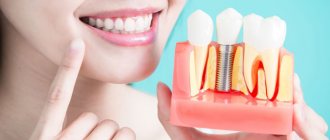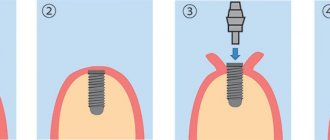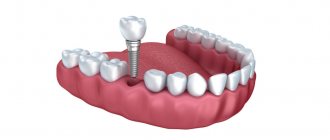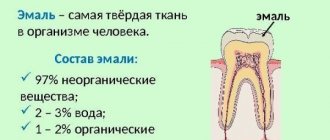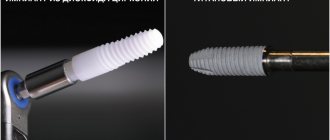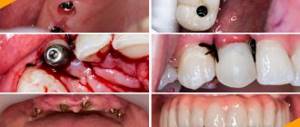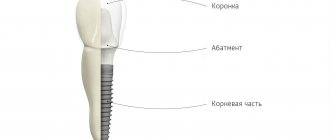The number of patients who prefer dental implants is increasing every year. This operation allows you to restore one or more teeth that have been lost. Removable dentures seem uncomfortable in comparison. They are losing relevance. This is because removable dentures need to be replaced regularly. In addition, it is not securely fixed in the oral cavity. Having learned about dental implantation, fewer and fewer people want to sacrifice perfectly healthy neighboring teeth and saw them for crowns. Thanks to implantation, it is possible to leave adjacent teeth intact and avoid the installation of removable dentures. Laser dental implantation is a new technique that can compete with classical types of surgical interventions.
Benefits of laser implantation
- The duration of implantation is short. It takes 15 to 30 minutes to complete the laser procedure.
- The laser as a surgical instrument has such qualities as safety, speed and accuracy.
- Thanks to it, limited administration of painkillers is possible. Accordingly, the treatment is painless and comfortable.
- The action of the laser is similar to a scalpel. The instrument coagulates tissue. This is why the patient does not lose blood during the procedure. The dentist has effective access to the areas where surgery is performed.
- Laser dental implantation guarantees an antimicrobial effect. This is why subsequent complications are almost impossible. Healing is easy and fast.
Feelings after the procedure
A day after implantation, pain may appear. It resembles the consequences of tooth extraction. The patient can take various painkillers that effectively relieve the pain effect. After completion of the procedure, there is a possibility of swelling, but the next day it completely subsides.
Getting used to the implant takes only one week. If the implantation was carried out according to all standards and using modern technologies, then after 5–7 days the patient does not feel the difference between artificial and natural teeth.
Factors influencing the risk of complications
These factors simultaneously influence the service life of the implant.
- The quality of the implant and prosthesis. This includes the biocompatibility of the material, physical properties, quality, mechanical strength, reliability of the connection of individual parts, microstructure, shape, quality of installation, as well as the manufacture of the crown.
- Implantation method and accompanying conditions. It combines the time it took for implantation, compliance with sterility, the traumatic nature of the manipulation, compliance with the rules of implantation, and the correct drilling of the holes.
- Caring for artificial teeth. Includes compliance with hygiene rules, mastering hygiene skills, sanitation of the oral cavity, proper care of dentures, treatment of caries lesions, and undergoing professional oral hygiene sessions.
Benefits of laser dental implantation
As a treatment technology, laser nano-dental implantation has no disadvantages, and its main advantage is that, thanks to the use of a laser, the implantation procedure takes place with less trauma to tissue and with greater comfort for the patient. In addition, the following advantages of implantation using this technique can be highlighted.
- Saving time . Treatment of soft tissues with a laser is 2 times faster than using a scalpel. Minimal blood loss. The laser beam has the property of instantly cauterizing dissected vessels, due to this, operations using it are often called bloodless.
- Antibacterial effect . Under the influence of the laser, all pathogenic bacteria in the implantation area die. Due to the absence of the need to use a scalpel, the risk of infection on instruments is eliminated.
- Aesthetics . Laser implantation reduces the area of soft tissue intervention and helps preserve more gum volume when performing treatment in the smile area.
- Short rehabilitation period . Due to the minimally traumatic procedure, the patient’s rehabilitation occurs much faster. As a rule, already on the third day he ceases to feel pain and discomfort, and the healing process proceeds without complications.
Cost of laser dental implantation
Laser dental implantation has a higher cost than classic implantation. The technique is characterized by many positive qualities, however, the difference in price is not so significant. The price consists of the expenses necessary to carry out this type of intervention. The dental clinic purchases equipment and trains dentists.
The average cost of laser dental implantation varies from 20 to 40 thousand rubles.
What does the price depend on?
- implantologist experience;
- reputation of the clinic;
- equipment price.
If you find the prices for laser implantation high, then upon closer examination it turns out that the costs are worth it. The right to use laser technology remains with the patient himself. If you value your time and health, then laser dental implantation is for you.
Content
- Implantation techniques
- Advantages and disadvantages
- Contraindications for laser implantation
- Dentists' opinion
- Dentistry Doctors Amazing Prices
High technologies are constantly penetrating all areas of medicine, including dentistry. Increasingly, due to the need to restore teeth using classical implantation, we hear about the use of laser. Is it worth the price, and what benefits does choosing laser dental implantation offer a patient?
Patient reviews
Laser dental implantation receives different reviews. Most often, their authors are doctors from dental clinics. Some implantologists are confident that thanks to the technique it was possible to minimize the number of complications. They are confident that the laser made the implantation process easier. Thanks to it, inflammatory processes are rarely observed, as is implant rejection.
According to other doctors, the laser beam is similar to a regular scalpel. Proof of the effectiveness of laser dental implantation is provided by positive patient reviews. The method has obvious advantages, but the preparation of the doctor is also important.
Patients clearly benefit from laser dental implants, despite differences of opinion among dentists.
The laser serves as a guarantee of success and acts as a reliable assistant for the surgeon. That is why, compared to a scalpel, it has the following advantages:
- Sterility. Living tissue does not have direct contact, as is the case with a surgical instrument. There is no risk of infection when cutting the gums.
- Antimicrobial action. Bacterial flora dies under the influence of a laser beam. This explains the absence of complications in the postoperative period.
- The doctor has access to the operated tissues and a large overview. When using a laser, the dentist does not have to cut a large area of soft tissue.
- The patient feels comfortable. The operation is faster and easier. After cutting the soft tissues, they heal instantly. This is the effect of a laser.
- During the traditional implantation technique, tissue necrosis sometimes occurs as a complication. The use of a laser eliminates this.
- The healing process is proceeding at an accelerated pace. Laser dental implantation requires almost half the time than the standard method. This is why the patient does not have to stay in the clinic for too long.
- Compared to implantation in the classic version, the doctor uses less anesthetic. For people suffering from chronic liver and kidney diseases, this is a valuable quality. The same can be said about patients who have intolerance to certain medications.
Contraindications
Laser implantation, compared to classical implantation, has no specific contraindications; the laser does not have a negative effect on humans. The main requirement is to use safety glasses as a safety measure. The cost of laser dental implantation is significantly higher than conventional implantation. After all, a dental company needs to recoup the costs of expensive equipment.
Stages of laser implantation
Laser implantation is carried out as follows:
- The dentist administers local anesthesia. First, he cuts the mucous membrane of the gum. The doctor uses a laser beam.
- Using a physiodispenser, the dentist places an implant into the jaw bone.
- The doctor sews up the mucous membrane.
- While the implant is healing, doctors install temporary prostheses. They are made of plastic.
- At the second stage, a laser beam is also used. With its help, the specialist opens the implant, after which he places the gum former.
- Only after this a permanent structure is placed in the place where the temporary prosthesis is installed.
Experts' opinion
Doctors note that laser implantation is a marketing ploy to attract clients. What do you need to know to make the right choice?
- If the laser is used incorrectly or unprofessionally, tissue damage may occur that is not immediately apparent. The consequences will become obvious a little later, after the mucous membrane has healed.
- The survival rate of the implant does not depend on the instrument used to cut the gum.
- Regarding blood loss, it should be noted that with a correctly performed incision with a scalpel, blood loss will also be small.
- In terms of exposure time, a scalpel cuts tissue faster than a laser beam.
- Psychological comfort is also a dubious advantage. To prepare the bed, special cutters are still used (for each type of implant, their own), but there is a specific smell of tissue cut by a laser.
According to experienced specialists, implantation is an absolutely precise manipulation, requiring, accordingly, a precise incision, which is best done with a scalpel.
During laser implantation, the doctor uses safety glasses as a safety measure, but is it possible to make a precise cut in them? In this sense, actions with a scalpel are much easier to control - both visually and manually.
The choice of method for installing a dental implant is determined by the dentist, having previously studied the patient’s clinical picture, body characteristics, age, and the amount of intervention required to restore missing teeth.
Recommendations after laser implantation
Pain, swelling and redness of the gums are normal in the first days after surgery. To relieve these symptoms, you should follow these recommendations:
- Take painkillers as prescribed by your doctor.
- Apply cold compresses to the cheek.
- In the first week after surgery, use only a soft toothbrush to brush your teeth.
- Use rinses with anti-inflammatory and aseptic effect.
- Eliminate solid foods from the menu.
- If the discomfort does not decrease on the third day, be sure to consult a doctor to avoid possible complications.
Indications and contraindications for laser implantation
Indications for laser implantation completely coincide with the indications for traditional implant installation.
In particular, the reasons for using this technique may be:
- single defects in the dentition;
- absence of several consecutive teeth;
- complete edentia;
- terminal defects in the dentition;
- intolerance to prosthetic structures.
In turn, contraindications to the laser implantation procedure are divided into absolute, relative and local.
Absolute contraindications include:
- cardiac diseases;
- endocrine disruptions;
- oncological diseases;
- alcoholism, drug addiction;
- disruptions in the functioning of the nervous system;
- immunodeficiency states;
- psychical deviations;
- blood clotting disorder;
- allergy to anesthetics;
- renal failure;
- age up to 22 years;
- diseases affecting bone tissue.
Relative grounds for refusal to perform a laser implantation procedure are:
- venereal diseases;
- lack of proper, balanced nutrition;
- frequent stressful situations.
In turn, local contraindications to the installation of implants include:
- bone deficiency;
- bruxism;
- excessive exposure of teeth to abrasion;
- pathological bite;
- failure to comply with dental hygiene requirements;
- abnormalities in the structure of the jaws;
- carious lesions of teeth.
